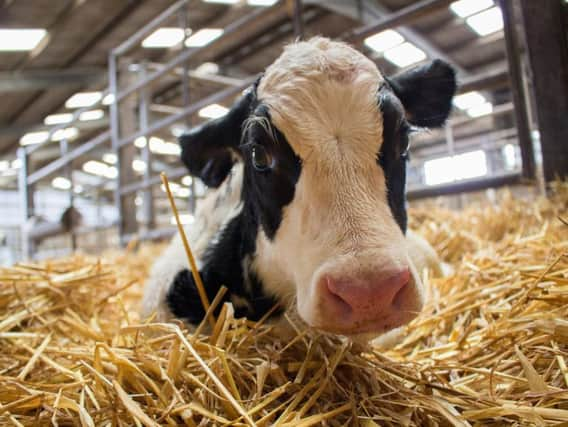Ethical farming in Scotland gets finance boost to keep calves and cows together


Rainton Farm in Castle Douglas will be focus of a £60,400 project run by Scotland’s Rural College (SRUC) to implement an "ethical model" which would see cows and calves kept together for five months rather than being separated within 24 hours of birth.
If successful the Scottish Government believes the Dumfries and Galloway model could be extended to other farms in a bid to make Scotland a leader in ethical dairying.
Advertisement
Hide AdAdvertisement
Hide AdColleen McCulloch, of Soil Association Scotland, which helped set up the Rural Innovation Support Service (RISS) group that brought the cow with calf project together at the farm of David and Wilma Finlay, said keeping calves and mothers together has benefits beyond their welfare.
"David and Wilma are at the forefront in Europe of turning this high-welfare dairy system into a successful, commercial operation," she said. "Keeping calves with their mother has benefits beyond welfare, for example, for rose veal and beef supply, as well as grassland management and biodiversity - but it is commercially challenging.
"The funding will allow Dr Marie Haskell, of Scotland's Rural College (SRUC), to run a year's pilot project to track the progress of the Finlays' operation and trial it on several other farms, with the aim of establishing a blueprint that could be adopted by any interested farm."
The investment, made through the Knowledge Transfer and Innovation Fund (KTIF), will also see Quality Meat Scotland receive £94,800 to develop a process of DNA analysis for meat traceability and integrity of the Scotch beef brand, involving 12,000 Scottish cattle holdings while Wholesome Pigs will receive £47,300 to better understand the environmental, health and management conditions of porcine pleurisy.
A further £53,0000 will go to the SRUC to link farmers and grass breeders to drive innovation and the College was also awarded just under £30,000 for a to develop a reliable system of organic canola production in Scotland in order to open up a new "potentially lucrative" source of income and provide alternative, locally produced livestock feed for farmers.
Finally, the Scottish Agricultural Organisation Society will receive £54,675 for a project which would see whole farms become digitally connected, and allow farmers to collect data.
Rural Affairs Minister Mairi Gougeon outlined the importance of funding the agricultural sector in Scotland.
"As we face a global climate emergency, investing and supporting innovative research within our agricultural sector has never been more important," she said.
Advertisement
Hide AdAdvertisement
Hide Ad"Farming is sometimes singled out as a climate offender, often by those who do not fully understand or appreciate its importance to our rural communities, or the work our farmers do to protect our environment.
"With this latest funding, the Knowledge Transfer and Innovation Fund has now invested around £5.7 million in projects that will help us continue to grow a sustainable, vibrant and innovative rural economy."